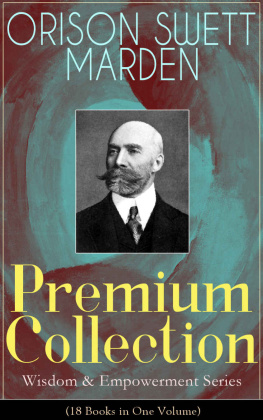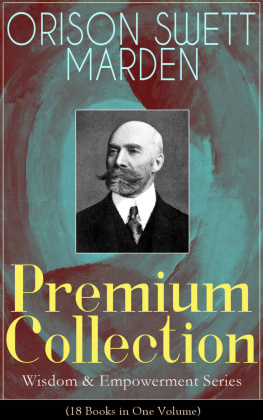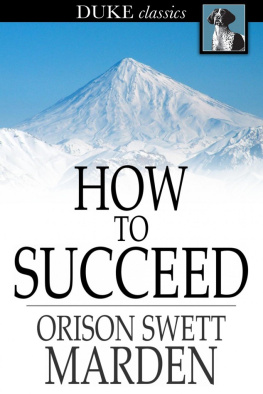Orison Swett Marden - An Iron Will
Here you can read online Orison Swett Marden - An Iron Will full text of the book (entire story) in english for free. Download pdf and epub, get meaning, cover and reviews about this ebook. publisher: Duke Classics, genre: Science. Description of the work, (preface) as well as reviews are available. Best literature library LitArk.com created for fans of good reading and offers a wide selection of genres:
Romance novel
Science fiction
Adventure
Detective
Science
History
Home and family
Prose
Art
Politics
Computer
Non-fiction
Religion
Business
Children
Humor
Choose a favorite category and find really read worthwhile books. Enjoy immersion in the world of imagination, feel the emotions of the characters or learn something new for yourself, make an fascinating discovery.
- Book:An Iron Will
- Author:
- Publisher:Duke Classics
- Genre:
- Rating:3 / 5
- Favourites:Add to favourites
- Your mark:
- 60
- 1
- 2
- 3
- 4
- 5
An Iron Will: summary, description and annotation
We offer to read an annotation, description, summary or preface (depends on what the author of the book "An Iron Will" wrote himself). If you haven't found the necessary information about the book — write in the comments, we will try to find it.
Are you one of millions who has bemoaned your utter lack of willpower? Have you ever considered how much you could accomplish and change in your life with a stronger will on your side? Whether you want to shed excess weight or grow your business, the helpful willpower-boosting tips and techniques that Orison Swett Marden presents in An Iron Will may be just what you need to get back on the path to success.
An Iron Will — read online for free the complete book (whole text) full work
Below is the text of the book, divided by pages. System saving the place of the last page read, allows you to conveniently read the book "An Iron Will" online for free, without having to search again every time where you left off. Put a bookmark, and you can go to the page where you finished reading at any time.
Font size:
Interval:
Bookmark:

From a 1901 edition
ISBN 978-1-62011-554-1
Duke Classics
2012 Duke Classics and its licensors. All rights reserved.
While every effort has been used to ensure the accuracy and reliability of the information contained in this edition, Duke Classics does not assume liability or responsibility for any errors or omissions in this book. Duke Classics does not accept responsibility for loss suffered as a result of reliance upon the accuracy or currency of information contained in this book.
"The education of the will is the object of our existence," saysEmerson.
Nor is this putting it too strongly, if we take into account the humanwill in its relations to the divine. This accords with the saying of J.Stuart Mill, that "a character is a completely fashioned will."
In respect to mere mundane relations, the development and discipline ofone's will-power is of supreme moment in relation to success in life. Noman can ever estimate the power of will. It is a part of the divinenature, all of a piece with the power of creation. We speak of God'sfiat "Fiat lux, Let light be." Man has his fiat. The achievements ofhistory have been the choices, the determinations, the creations, of thehuman will. It was the will, quiet or pugnacious, gentle or grim, of menlike Wilberforce and Garrison, Goodyear and Cyrus Field, Bismarck andGrant, that made them indomitable. They simply would do what theyplanned. Such men can no more be stopped than the sun can be, or thetide. Most men fail, not through lack of education or agreeable personalqualities, but from lack of dogged determination, from lack of dauntlesswill.
"It is impossible," says Sharman, "to look into the conditions underwhich the battle of life is being fought, without perceiving how muchreally depends upon the extent to which the will-power is cultivated,strengthened, and made operative in right directions." Young people needto go into training for it. We live in an age of athletic meets. Thosewho are determined to have athletic will-power must take for it the kindof exercise they need.
This is well illustrated by a report I have seen of the long race fromMarathon in the recent Olympian games, which was won by the young Greekpeasant, Sotirios Lous.
There had been no great parade about the training of this championrunner. From his work at the plough he quietly betook himself to thetask of making Greece victorious before the assembled strangers fromevery land. He was known to be a good runner, and without fuss or bustlehe entered himself as a competitor. But it was not his speed alone,out-distancing every rival, that made the young Greek stand out fromamong his fellows that day. When he left his cottage home at Amarusi,his father said to him, "Sotiri, you must only return a victor!" Thelight of a firm resolve shone in the young man's eye. The old father wassure that his boy would win, and so he made his way to the station,there to wait till Sotiri should come in ahead of all the rest. No oneknew the old man and his three daughters as they elbowed their waythrough the crowd. When at last the excitement of the assembledmultitude told that the critical moment had arrived, that the racerswere nearing the goal, the old father looked up through eyes that were alittle dim as he realized that truly Sotiri was leading the way. Hewas "returning a victor." How the crowd surged about the young peasantwhen the race was fairly won! Wild with excitement, they knew not how toshower upon him sufficient praise. Ladies overwhelmed him with flowersand rings; some even gave him their watches, and one American ladybestowed upon him her jewelled smelling-bottle. The princes embracedhim, and the king himself saluted him in military fashion. But the youngSotirios was seeking for other praise than theirs. Past the ranks ofroyalty and fair maidenhood, past the outstretched hands of his owncountrymen, past the applauding crowd of foreigners, his gaze wanderedtill it fell upon an old man trembling with eagerness, who resolutelypushed his way through the excited, satisfied throng. Then the youngface lighted, and as old Lous advanced to the innermost circle witharms outstretched to embrace his boy, the young victor said, simply:"You see, father, I have obeyed."
The athlete trains for his race; and the mind must be put into trainingif one will win life's race.
"It is," says Professor Mathews, "only by continued, strenuous efforts,repeated again and again, day after day, week after week, and monthafter month, that the ability can be acquired to fasten the mind to onesubject, however abstract or knotty, to the exclusion of everythingelse. The process of obtaining this self-masterythis complete commandof one's mental powersis a gradual one, its length varying with themental constitution of each person; but its acquisition is worthinfinitely more than the utmost labor it ever costs."
"Perhaps the most valuable result of all education," it was said byProfessor Huxley, "is the ability to make yourself do the thing you haveto do when it ought to be done, whether you like it or not; it is thefirst lesson which ought to be learned, and, however early a man'straining begins, it is probably the last lesson which he learnsthoroughly."
When Henry Ward Beecher was asked how it was that he could accomplish somuch more than other men, he replied:
"I don't do more, but less, than other people. They do all their workthree times over: once in anticipation, once in actuality, once inrumination. I do mine in actuality alone, doing it once instead of threetimes."
This was by the intelligent exercise of Mr. Beecher's will-power inconcentrating his mind upon what he was doing at a given moment, andthen turning to something else. Any one who has observed business menclosely, has noticed this characteristic. One of the secrets of asuccessful life is to be able to hold all of our energies upon onepoint, to focus all of the scattered rays of the mind upon one place orthing.
The mental reservoir of most people is like a leaky dam which wesometimes see in the country, where the greater part of the water flowsout without going over the wheel and doing the work of the mill. Thehabit of mind-wandering, of worrying about this and that,
"Genius, that power which dazzles mortal eyes, Is oft but Perseverance in disguise."
Many a man would have been a success had he connected his fragmentaryefforts. Spasmodic, disconnected attempts, without concentration,uncontrolled by any fixed idea, will never bring success. It iscontinuity of purpose alone that achieves results.
The way to learn to run is to run, the way to learn to swim is to swim.The way to learn to develop will-power is by the actual exercise ofwill-power in the business of life. "The man that exercises his will,"says an English essayist, "makes it a stronger and more effective forcein proportion to the extent to which such exercise is intelligently andperseveringly maintained." The forth-putting of will-power is a means ofstrengthening will-power. The will becomes strong by exercise. To stickto a thing till you are master, is a test of intellectual discipline andpower.
"It is astonishing," says Dr. Theodore Cuyler, "how many men lack thispower of 'holding on' until they reach the goal. They can make a suddendash, but they lack grit. They are easily discouraged. They get on aslong as everything goes smoothly, but when there is friction they loseheart. They depend on stronger personalities for their spirit andstrength. They lack independence or originality. They only dare to dowhat others do. They do not step boldly from the crowd and actfearlessly."
Font size:
Interval:
Bookmark:
Similar books «An Iron Will»
Look at similar books to An Iron Will. We have selected literature similar in name and meaning in the hope of providing readers with more options to find new, interesting, not yet read works.
Discussion, reviews of the book An Iron Will and just readers' own opinions. Leave your comments, write what you think about the work, its meaning or the main characters. Specify what exactly you liked and what you didn't like, and why you think so.











